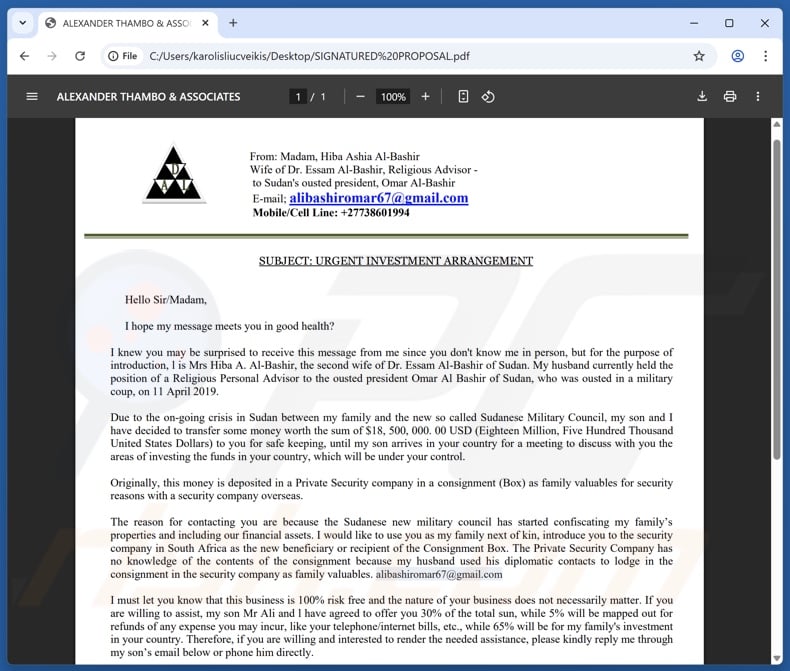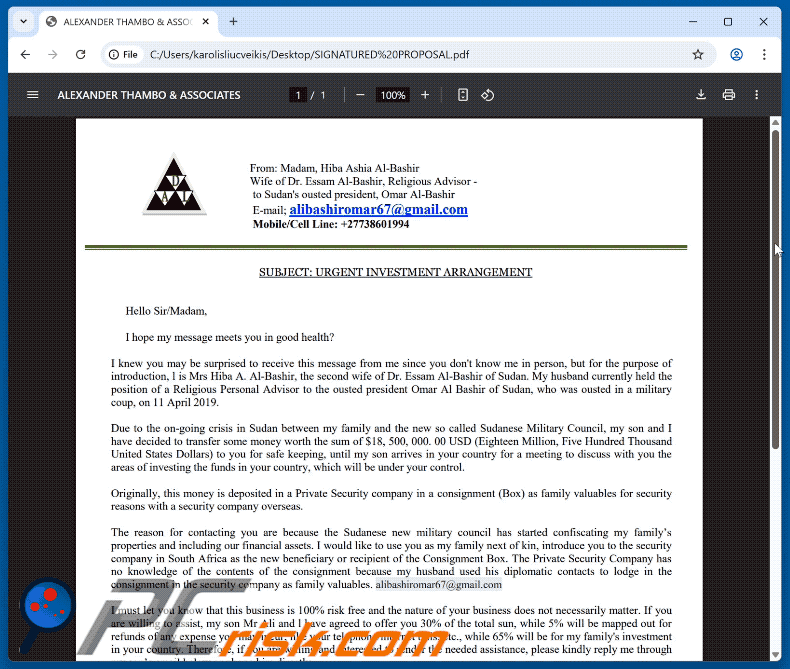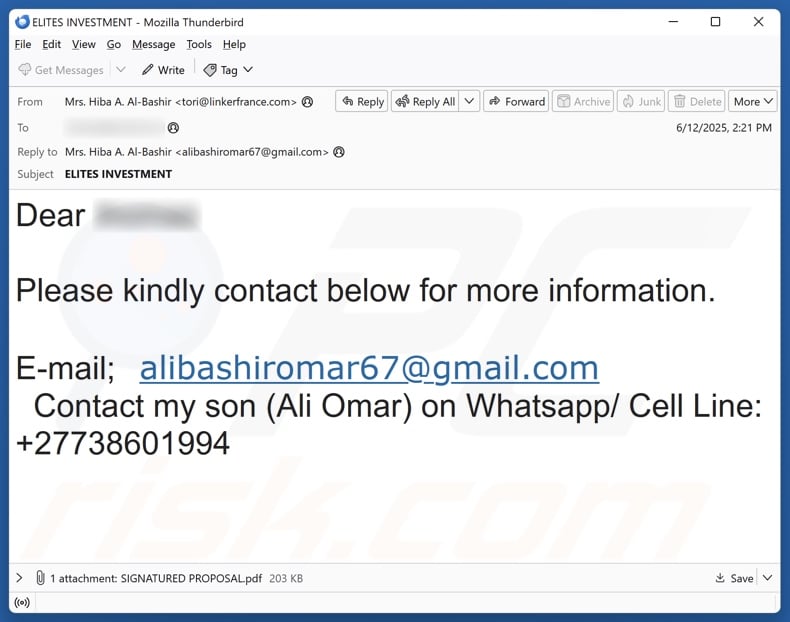How to recognize fake emails like "Urgent Investment Arrangement"
Phishing/ScamAlso Known As: "Urgent Investment Arrangement" spam email
Get free scan and check if your device is infected.
Remove it nowTo use full-featured product, you have to purchase a license for Combo Cleaner. Seven days free trial available. Combo Cleaner is owned and operated by RCS LT, the parent company of PCRisk.com.
What kind of email is "Urgent Investment Arrangement"?
After investigating the "Urgent Investment Arrangement" email, we learned that it is spam. The attachment proposes a deal to the recipient, wherein they will be presented as the sender's relative to safeguard exorbitant funds. In exchange, they are promised 30% of the money.
It must be emphasized that all the information in this message is fake, and it is not associated with any real individuals, public figures, or legitimate entities.

"Urgent Investment Arrangement" email scam overview
The spam email with the subject "ELITES INVESTMENT" (may vary) instructs the recipient to email the provided address for more information.
The email attachment – "SIGNATURED PROPOSAL.pdf" (filename may vary) – introduces the sender as the second wife of a man who had held the position of a "Religious Personal Advisor" to the military-ousted president of Sudan – Omar al-Bashir.
The sender's family had transferred funds out of the country due to the ongoing crisis that has led to some of their assets being seized. Hence, a security company in South Africa has been entrusted with 18.5 million USD and other valuables. The sender proposes presenting the email recipient as their relative – thus enabling them to access the assets and keep them safe.
If an agreement is reached, the sender's son will discuss how to invest the funds in the recipient's country upon arrival. For their assistance, the recipient is promised 30% of the funds, an additional 5% for any expenses incurred, and 65% will be invested in the country. According to the document, this farcical offer is risk-free and must be kept strictly confidential.
It must be reiterated that all the claims made by this scam are false, and it is in no way associated with any real individuals, public figures, or entities.
Typically, spam campaigns of this kind aim to obtain victim's personally identifiable information and/or trick them into sending money to scammers. How these goals are achieved can differ significantly.
Where targeting data concerns, scammers can ask for it directly or rely on phishing websites/files. Information of interest can include ID card details, passport scans/photos, online bank log-in credentials, banking account data, credit/debit card numbers, and so on.
Scammers may request money for legitimate-sounding reasons like handling taxes or paying fees and even promise that the victim will be compensated (as the "Urgent Investment Arrangement" attachment implies). Usually, difficult-to-trace methods are used for fund acquisition (e.g., digital currencies, pre-paid vouchers, cash hidden in packages and shipped, gift cards, etc.); thus, scammers diminish the chances of successful prosecution and money retrieval by victims.
To summarize, by trusting an email like "Urgent Investment Arrangement" – users can experience severe privacy issues, financial losses, and identity theft.
If you have disclosed your personally identifiable or finance-related data to scammers – immediately contact the appropriate authorities.
| Name | "Urgent Investment Arrangement" spam email |
| Threat Type | Phishing, Scam, Social Engineering, Fraud |
| Fake Claim | Recipient is offered 30% of 18.6 million in exchange for safeguarding these funds. |
| Attachment(s) | SIGNATURED PROPOSAL.pdf (filename may vary) |
| Symptoms | Unauthorized online purchases, changed online account passwords, identity theft, illegal access of the computer. |
| Distribution methods | Deceptive emails, rogue online pop-up ads, search engine poisoning techniques, misspelled domains. |
| Damage | Loss of sensitive private information, monetary loss, identity theft. |
| Malware Removal (Windows) |
To eliminate possible malware infections, scan your computer with legitimate antivirus software. Our security researchers recommend using Combo Cleaner. Download Combo CleanerTo use full-featured product, you have to purchase a license for Combo Cleaner. 7 days free trial available. Combo Cleaner is owned and operated by RCS LT, the parent company of PCRisk.com. |
Spam campaigns in general
Spam campaigns are used to promote various scams, including advance fee, phishing, sextortion, tech support, refund, and so on. This mail is also utilized in malware distribution.
Spam emails are often poorly written and riddled with spelling/grammatical errors. However, spam mail can be competently put together and convincingly disguised as messages from legitimate entities (e.g., companies, organizations, institutions, service providers, authorities, etc.).
We have investigated numerous spam campaigns; "Intuit QuickBooks Account Confirmation", "Capital One Fraud Monitoring Department", "Humanitarian Aid And Compensation", "DocuSign - Signature Needed", "Affirm Account Status By Completing CAPTCHA", "Intelcom Email Scam", "Keep And Invest Funds", "ExxonMobil Email Scam", "World Tourism Organization", "Big Lotto", and "Payment Has Been Remitted Into Your Account" are just some of our latest articles.
How do spam campaigns infect computers?
Spam campaigns proliferate malware by distributing virulent files as attachments or download links. These files come in various formats, e.g., documents (PDF, Microsoft Office, Microsoft OneNote, etc.), executables (EXE, RUN, etc.), archives (ZIP, RAR, etc.), JavaScript, and so forth.
Merely opening a malicious file can be enough to jumpstart the infection chain. However, some formats require additional actions to start malware download/installation processes. For example, Microsoft Office documents need users to enable macro commands (i.e., editing/content), while OneNote files require them to click on embedded links or files.
How to avoid installation of malware?
We highly recommend vigilance with incoming emails, PMs/DMs, SMSes, and other messages. Attachments or links found in dubious communications must not be opened, as they can be harmful or infectious.
However, malware is spread using various techniques. Therefore, we advise caution when browsing since the Internet is full of deceptive and dangerous content.
Furthermore, all downloads must be made from official and trustworthy channels. Another recommendation is to activate and update programs using genuine functions/tools, as illegal activation tools ("cracks") and third-party updates can contain malware.
We must stress the importance of having a reputable antivirus installed and kept up-to-date. Security software must be used to run regular system scans and to remove detected threats. If you've already opened malicious attachments, we recommend running a scan with Combo Cleaner Antivirus for Windows to automatically eliminate infiltrated malware.
Appearance of the "SIGNATURED PROPOSAL.pdf" email attachment (GIF):

Text presented in this document:
From: Madam, Hiba Ashia Al-Bashir
Wife of Dr. Essam Al-Bashir, Religious Advisor -
to Sudan's ousted president, Omar Al-Bashir
E-mail; alibashiromar67@gmail.com
Mobile/Cell Line: +27738601994SUBJECT: URGENT INVESTMENT ARRANGEMENT
Hello Sir/Madam,
I hope my message meets you in good health?
I knew you may be surprised to receive this message from me since you don't know me in person, but for the purpose of
introduction, l is Mrs Hiba A. Al-Bashir, the second wife of Dr. Essam Al-Bashir of Sudan. My husband currently held the
position of a Religious Personal Advisor to the ousted president Omar Al Bashir of Sudan, who was ousted in a military
coup, on 11 April 2019.Due to the on-going crisis in Sudan between my family and the new so called Sudanese Military Council, my son and I
have decided to transfer some money worth the sum of $18, 500, 000. 00 USD (Eighteen Million, Five Hundred Thousand
United States Dollars) to you for safe keeping, until my son arrives in your country for a meeting to discuss with you the
areas of investing the funds in your country, which will be under your control.Originally, this money is deposited in a Private Security company in a consignment (Box) as family valuables for security
reasons with a security company overseas.The reason for contacting you are because the Sudanese new military council has started confiscating my family's
properties and including our financial assets. I would like to use you as my family next of kin, introduce you to the security
company in South Africa as the new beneficiary or recipient of the Consignment Box. The Private Security Company has
no knowledge of the contents of the consignment because my husband used his diplomatic contacts to lodge in the
consignment in the security company as family valuables. alibashiromar67@gmail.comI must let you know that this business is 100% risk free and the nature of your business does not necessarily matter. If you
are willing to assist, my son Mr Ali and l have agreed to offer you 30% of the total sun, while 5% will be mapped out for
refunds of any expense you may incur, like your telephone/internet bills, etc., while 65% will be for my family's investment
in your country. Therefore, if you are willing and interested to render the needed assistance, please kindly reply me through
my son's email below or phone him directly.Reply me urgently for more info/clarifications and procedures.
E-mail; alibashiromar67@gmail.com
Or call my son Ali on his Mobile/Cell Line in South Africa: +27738601994Remember that this is Highly Confidential and the success of this transaction depends on how secret it is been kept or
handled by you, as I do not want the new Military Government to have the knowledge of this money.Thanks and may Allah Grant us Smooth Transaction and long family/business relationship, expecting your reply soonest.
Best regards,
Thanks and my Best Regards
Mrs Hiba A. Al-Bashir.
Screenshot of the "Urgent Investment Arrangement" spam email:

Text presented in this email letter:
Subject: ELITES INVESTMENT
Dear -
Please kindly contact below for more information.
E-mail; alibashiromar67@gmail.com
Contact my son (Ali Omar) on Whatsapp/ Cell Line: +27738601994
Instant automatic malware removal:
Manual threat removal might be a lengthy and complicated process that requires advanced IT skills. Combo Cleaner is a professional automatic malware removal tool that is recommended to get rid of malware. Download it by clicking the button below:
DOWNLOAD Combo CleanerBy downloading any software listed on this website you agree to our Privacy Policy and Terms of Use. To use full-featured product, you have to purchase a license for Combo Cleaner. 7 days free trial available. Combo Cleaner is owned and operated by RCS LT, the parent company of PCRisk.com.
Quick menu:
- What is "Urgent Investment Arrangement" spam email?
- Types of malicious emails.
- How to spot a malicious email?
- What to do if you fell for an email scam?
Types of malicious emails:
![]() Phishing Emails
Phishing Emails
Most commonly, cybercriminals use deceptive emails to trick Internet users into giving away their sensitive private information, for example, login information for various online services, email accounts, or online banking information.
Such attacks are called phishing. In a phishing attack, cybercriminals usually send an email message with some popular service logo (for example, Microsoft, DHL, Amazon, Netflix), create urgency (wrong shipping address, expired password, etc.), and place a link which they hope their potential victims will click on.
After clicking the link presented in such email message, victims are redirected to a fake website that looks identical or extremely similar to the original one. Victims are then asked to enter their password, credit card details, or some other information that gets stolen by cybercriminals.
![]() Emails with Malicious Attachments
Emails with Malicious Attachments
Another popular attack vector is email spam with malicious attachments that infect users' computers with malware. Malicious attachments usually carry trojans that are capable of stealing passwords, banking information, and other sensitive information.
In such attacks, cybercriminals' main goal is to trick their potential victims into opening an infected email attachment. To achieve this goal, email messages usually talk about recently received invoices, faxes, or voice messages.
If a potential victim falls for the lure and opens the attachment, their computers get infected, and cybercriminals can collect a lot of sensitive information.
While it's a more complicated method to steal personal information (spam filters and antivirus programs usually detect such attempts), if successful, cybercriminals can get a much wider array of data and can collect information for a long period of time.
![]() Sextortion Emails
Sextortion Emails
This is a type of phishing. In this case, users receive an email claiming that a cybercriminal could access the webcam of the potential victim and has a video recording of one's masturbation.
To get rid of the video, victims are asked to pay a ransom (usually using Bitcoin or another cryptocurrency). Nevertheless, all of these claims are false - users who receive such emails should ignore and delete them.
How to spot a malicious email?
While cyber criminals try to make their lure emails look trustworthy, here are some things that you should look for when trying to spot a phishing email:
- Check the sender's ("from") email address: Hover your mouse over the "from" address and check if it's legitimate. For example, if you received an email from Microsoft, be sure to check if the email address is @microsoft.com and not something suspicious like @m1crosoft.com, @microsfot.com, @account-security-noreply.com, etc.
- Check for generic greetings: If the greeting in the email is "Dear user", "Dear @youremail.com", "Dear valued customer", this should raise suspiciousness. Most commonly, companies call you by your name. Lack of this information could signal a phishing attempt.
- Check the links in the email: Hover your mouse over the link presented in the email, if the link that appears seems suspicious, don't click it. For example, if you received an email from Microsoft and the link in the email shows that it will go to firebasestorage.googleapis.com/v0... you shouldn't trust it. It's best not to click any links in the emails but to visit the company website that sent you the email in the first place.
- Don't blindly trust email attachments: Most commonly, legitimate companies will ask you to log in to their website and to view any documents there; if you received an email with an attachment, it's a good idea to scan it with an antivirus application. Infected email attachments are a common attack vector used by cybercriminals.
To minimise the risk of opening phishing and malicious emails we recommend using Combo Cleaner Antivirus for Windows.
Example of a spam email:

What to do if you fell for an email scam?
- If you clicked on a link in a phishing email and entered your password - be sure to change your password as soon as possible. Usually, cybercriminals collect stolen credentials and then sell them to other groups that use them for malicious purposes. If you change your password in a timely manner, there's a chance that criminals won't have enough time to do any damage.
- If you entered your credit card information - contact your bank as soon as possible and explain the situation. There's a good chance that you will need to cancel your compromised credit card and get a new one.
- If you see any signs of identity theft - you should immediately contact the Federal Trade Commission. This institution will collect information about your situation and create a personal recovery plan.
- If you opened a malicious attachment - your computer is probably infected, you should scan it with a reputable antivirus application. For this purpose, we recommend using Combo Cleaner Antivirus for Windows.
- Help other Internet users - report phishing emails to Anti-Phishing Working Group, FBI’s Internet Crime Complaint Center, National Fraud Information Center and U.S. Department of Justice.
Frequently Asked Questions (FAQ)
Why did I receive this email?
Regardless of any relevant details in spam emails, they are not personal. This mail is distributed in massive operations – hence, thousands of users receive identical or incredibly similar emails.
I have provided my personal information when tricked by this spam email, what should I do?
If you have provided your log-in credentials – immediately change the passwords of all potentially compromised accounts and inform their official support. However, if you have disclosed other private information (e.g., ID card details, passport photos/entities, credit card numbers, etc.) – contact relevant authorities without delay.
I have read a spam email but didn't open the attachment, is my computer infected?
Reading an email is harmless; devices are infected when malicious attachments or links are opened/clicked.
I have downloaded and opened a file attached to a spam email, is my computer infected?
Whether the system was compromised might depend on the opened file's format. Once opened, executables cause infections almost without fail. However, some formats – like documents – might need additional actions to initiate malware download/installation (e.g., enabling macros, clicking embedded content, etc.).
Will Combo Cleaner remove malware infections present in email attachments?
Combo Cleaner is designed to scan devices and remove all kinds of threats. It can detect and eliminate most of the known malware infections. Remember that performing a complete system scan is essential since sophisticated malicious software typically hides deep within systems.
Share:

Tomas Meskauskas
Expert security researcher, professional malware analyst
I am passionate about computer security and technology. I have an experience of over 10 years working in various companies related to computer technical issue solving and Internet security. I have been working as an author and editor for pcrisk.com since 2010. Follow me on Twitter and LinkedIn to stay informed about the latest online security threats.
PCrisk security portal is brought by a company RCS LT.
Joined forces of security researchers help educate computer users about the latest online security threats. More information about the company RCS LT.
Our malware removal guides are free. However, if you want to support us you can send us a donation.
DonatePCrisk security portal is brought by a company RCS LT.
Joined forces of security researchers help educate computer users about the latest online security threats. More information about the company RCS LT.
Our malware removal guides are free. However, if you want to support us you can send us a donation.
Donate
▼ Show Discussion